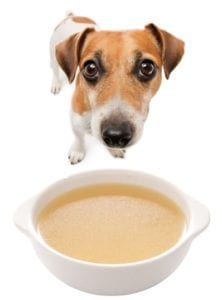Bone broth can be used in many ways, but most importantly to hydrate & nourish ill animals, and assist in healing the gut of those dogs and cats suffering recurring or chronic vomiting or diarrhoea symptoms.
There is no single recipe for bone broth. The two things all recipes have in common:
- The addition of an acidic liquid. This helps draw the minerals out of the bones more thoroughly. Raw Apple Cider Vinegar is most commonly used, and it’s well regarded by herbalists for its ability to draw minerals out of plants. Lemon juice may be substituted.
- Long Cooking Time. This is necessary to get the full nutrition out of the bones. There is no magic time, with some only cooking 2-3 hours and others choosing to cook for a full 24 hours. A slow cooker can be helpful but a well-monitored large pot on the stove works too.
- Start with raw and/or cooked bones.
Be sure to include joint bones with cartilage if you’re after collagen and other joint care nutrients. Choose any free-range, grass-fed or wild carcasses. Chicken frames are good. You can collect and save bones from your own meals in the freezer but be sure to rinse any sauce off that may be irritating to your dog’s digestive system. If you are planning to use it as more of a meal (for those whose gut is healthy) or want plenty of meat included use a whole chicken, turkey leg quarters, or other meaty bones. You can also add meat from another species (use poultry bones with beef chunks, for example). - Completely cover the bones with water & add vinegar.
Cover with an inch or two of water, but not too much more, in order to keep the broth dense. Add raw apple cider vinegar, 2 tablespoons for a large pot. Put the lid on (and keep it on for the duration) and set your slow cooker to low, or pot to simmer. Remove the scum layer as if forms. - When finished:
Pour through a strainer, discard the bones (do not feed these to your dog!) and put the meat and soft tissue back in. If it has a jelly-like consistency when it’s chilled that’s a good thing. Cool and leave the hard layer of fat in place until the broth is eaten (feed the fat layer unless your dog suffers pancreatitis). - Storing:
You can freeze this broth in small containers for easy dispensing or store it in your refrigerator for about 3 days. - Start Slow:
If they’ve never eaten collagen rich food before their stools may be a bit loose initially.
Further information:
Information provided by Dr. Lyn Thomson at www.rawessentials.co.nz. and from http://feline-nutrition.org/health/feline-inflammatory-bowel-disease-nature-and-treatment. Bone broth recipe from ‘The Art of Dog’ Helping Dogs Heal Themselves Holistically,Margaret Nee, http://www.theartofdog.com/
